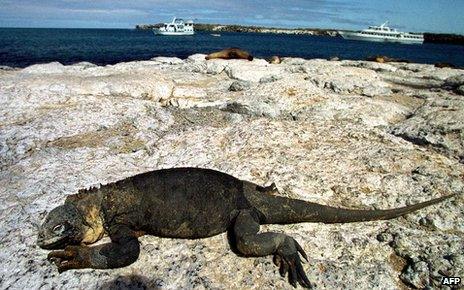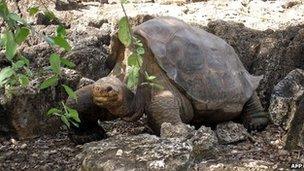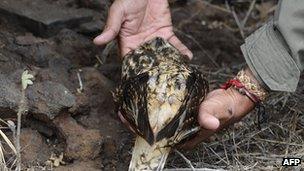Trouble in Galapagos 'paradise' for Ecuador locals
- Published

Fears that rising tourist visitor numbers could threaten the island's unique wildlife have not been borne out but other challenges remain
Ecuador's Galapagos Islands, lying 1,000 km (621 miles) off-shore in the Pacific Ocean, are famed as the natural laboratory that inspired Charles Darwin to develop the theory of evolution.
Surging growth in tourism and local population during the boom times led to serious fears about whether their unique ecosystems could survive the pressure.
Now, awareness of these twin threats appears to have spurred the government into faster action.
On 1 June, President Rafael Correa warned that the islands faced "multiple problems" from "disorder, a lot of abuse, a lot of anarchy, lack of policies".
In a break with tradition, he named an outsider, Maria Isabel Salvador, who was Ecuador's ambassador to the Organization of American States, to run the archipelago.
"The message was very clear, the government is preparing to make some unpopular decisions," says Reyna Oleas, an ecologist in Puerto Ayora, the islands' biggest town.
Already, some fuel subsidies have been cut and the permitted number of cars capped because of the 13,000 birds they run over each year.
In recent years, with the rapid growth of both luxury and backpack travel, tourists have flocked to the islands to wonder at its unique giant tortoises, tame sea lions, and abundant birdlife.
The tourism boom prompted warnings that the visitors would inflict untold damage on the archipelago. Sheer numbers were considered the main threat.
In 1980, environmentalists worried that too many people were arriving, and called for no more than 12,000 a year. That's less than a tenth of present visitors.
Since 2007, tourist numbers have stagnated at around 170,000 annually because of the global financial crisis. If pre-crisis growth rates had continued, there were fears that number could have reached 300,000 tourists.
The slowdown has eased calls for a ceiling on tourists. And observers argue the industry remains the lifeblood of the economy, and needs to be regulated, rather than prohibited.
"If not for tourism, these islands would have been destroyed long ago," says Fernando Delgado, a hotel manager with a long working experience on the archipelago.

Among the rare species on the Galapagos was the giant tortoise, 'Lonesome George', who died in 2012.
Scientists say the areas that tourists visit are well-supervised. More than 90% of the islands, surrounded by a vast marine preserve, are officially off limits.
However, few spots have been truly left untouched by human presence.
By the time Darwin visited in 1835, Ecuador had annexed the islands, and established a penal colony. Rats and goats soon followed the felons.
For Godfrey Merlen, a British biologist who has lived on the islands for four decades, controlling alien species is the top priority.
The cost of eradication programmes and research would run only to several million dollars a year, he says, a relatively small portion of Ecuador's planned $30 billion 2013 budget.
Merlen recommends the government create a central hub for goods shipped in from the mainland to control better what gets transported where between the inhabited islands, as each has its own distinct environment and species.
However, the archipelago is not a paradise for all.
Aside from the azure waters and nearby unspoilt white beaches, little distinguishes Puerto Ayora, where two-thirds of the islands' 26,000 people live, from the mainland's many grim towns of concrete and corrugated tin roofs.
Many people on the Galapagos are locked in their own Darwinian struggle for a share of the dollars that tourism has brought in. Allegations of corruption and drug smuggling add to the small-town cauldron of jealous competition.
Despite the estimated annual influx of $150m from tourism into the Galapagos economy, poverty remains a serious problem.
A 2010 government study found that 31% of residents are poor, measured according to how well their basic needs are met.
Galapagos also has above-average rates of domestic violence for Ecuador. More than 40% of the adult population have had only basic or no schooling at all, though literacy rates are higher than on the mainland.
While Ecuador gets positive marks for the conservation effort, many locals feel hemmed in. They experience freedom of movement when they visit relatives on the mainland.
At home, residents are restricted to the 3% of the islands not officially part of the national park, and prices for trips are too high for them to visit the same spots that tourists rave about.
Mr Delgado believes this reduces their appreciation for conservation.
But while highlighting problems, the data also show efforts going into policing the islands.
"One can get the wrong impression from the terrible headlines," says Ms Oleas.
"The trend shows an improvement, though the rhythm may be slower than hoped for."

Thousands of birds, such as this owl, die every year. Many are killed by traffic on the road.
Population growth, which had averaged almost 6% annually in the late 20th Century, has flattened markedly, although it still averaged 2.2% from 2002 to 2010.
There is also no clear evidence of people being responsible for any decline in the population of animal species, says Mr Merlen.
"There are huge efforts being made to establish rules and regulations," he says, including a new quarantine agency announced by President Correa in October.
The government has also been commended for stepping up controls of illegal immigration to the islands, despite some reports of police heavy-handedly returning people to the mainland.
More rules will follow.
The problems are not limited to those on dry land. Environmentalists also complain of pressures from industrial and sport fishing on the vast marine preserve that surrounds the islands.
In the 1990s, trafficking in sea cucumbers to Asia where they are a delicacy almost wiped out common species.
Poorly-regulated speedboats intended only for transport from one island to another offer detours for unsupervised visits to limited legal landing sites, with the risk of destruction and transmission of seeds and insects from one island to another.
"You need extremely strong willpower and goodwill to get things done," says Mr Merlen.
"At the end of the day, they're all people problems."